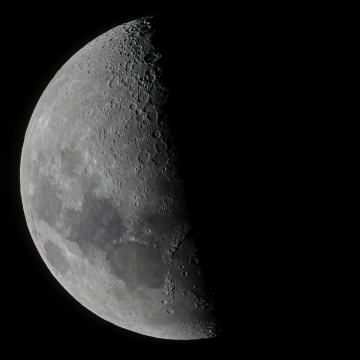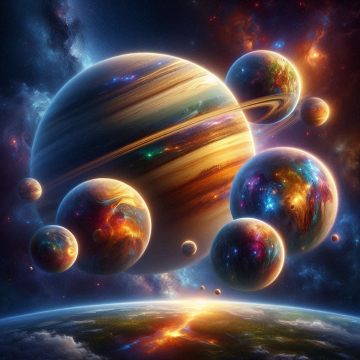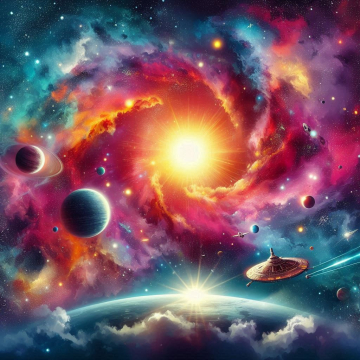Lunar cycles have fascinated humanity since time immemorial. The influence of the moon on Earth is undeniable, and there has been speculation about how it could affect various aspects of our lives. One of the fields in which this connection has been explored is in women's health and, more specifically, the menstrual cycle.
The Power of the Moon on Earth
The power of the moon on Earth is an amazing phenomenon that has captivated humanity throughout history. This lunar influence manifests itself in various ways, with ocean tides being one of the most visible examples. The moon's gravitational pull causes the periodic rise and fall of sea levels, creating the high and low tides we experience on coasts around the world.
In addition to its impact on the tides, the moon also influences other aspects of the Earth. There has been speculation that the moon may play a role in seismic activity, although this relationship is not yet fully understood. Additionally, some believe that the moon can influence climate and weather patterns, although these effects are difficult to prove scientifically.
In the cultural and spiritual sphere, the moon has played a significant role in myths, rituals and calendars of various civilizations. Mystical properties are attributed to it and it is considered a symbol of cycles, rebirth and transformation.
However, when it comes to human health, the direct influence of the moon on menstrual cycles or fertility is the subject of debate and speculation. Although many ancient cultures believed in this connection, modern science has shed light on the fact that menstrual cycles are primarily regulated by internal biological processes and hormones, rather than by lunar phases.
Myths and Legends
Throughout history, myths and legends have been woven around the lunar influence on menstruation and fertility. For example, it was said that women ovulated and menstruated on the full Moon, and that it was the most fertile time of the month. On the other hand, the new Moon was associated with infertility or irregular menstruation. These beliefs, although poetic, lack solid scientific foundations.
Science and Reality
While it is true that the moon exerts a gravitational influence on the Earth, this influence is too weak to directly affect women's menstrual cycles. The menstrual cycle is mainly regulated by hormones and the body's internal biological processes.
However, there is an interesting theory that suggests that moon phases can have an effect on people's psychology and emotional well-being. Some women report experiencing mood and emotional changes in sync with the lunar phases, but this is highly subjective and lacks solid scientific evidence.
Menstrual Synchronization and Moon
One of the most intriguing concepts related to lunar cycles and the menstrual cycle is "menstrual synchronization." It has been suggested that when women live in close proximity, such as in dormitories or gated communities, their menstrual cycles may become synchronized over time. This has led to the idea that lunar phases can also influence the timing of menstrual cycles.
However, research on menstrual synchronization has yielded mixed results and its validity has often been questioned. Scientific studies have not provided strong evidence that moon phases are a determining factor in menstrual timing. Instead, it has been proposed that factors such as pheromones and social communication may play a more important role.
The Impact of Stress and Lifestyle
Instead of focusing on lunar cycles, it is essential to recognize that stress, lifestyle, and other factors can significantly influence the menstrual cycle. Chronic stress, lack of sleep, poor diet, and sudden changes in body weight are just a few examples of how lifestyle can affect the regularity of the menstrual cycle.
Women are unique, and their bodies can react differently to various factors. Therefore, it is essential to pay attention to the signals that your own body is giving you and seek advice from a health professional if you experience significant changes in your menstrual cycle.
The Importance of Knowledge and Medical Care
The importance of knowledge and medical care is a fundamental pillar in caring for women's health and understanding menstrual cycles. In a world where information is abundant but sometimes contradictory, it is essential to base our health decisions on knowledge supported by science and the guidance of health professionals.
In the context of women's health and menstrual cycles, this takes on special relevance. Every woman is unique, and her experiences and challenges related to her menstrual cycle can vary widely. By seeking and acquiring solid knowledge about how the menstrual cycle works and the signals the body emits, women are better equipped to identify and understand any irregularities or concerns.
Healthcare plays a crucial role in women's health. Health professionals, such as gynecologists and women's health doctors, can provide accurate evaluations and diagnoses, as well as personalized guidance to address any menstrual or reproductive health concerns. Regular medical care is also essential for monitoring health throughout a woman's life, from adolescence to menopause and beyond.
The importance of seeking medical attention for any concerns or significant changes in the menstrual cycle cannot be underestimated. By doing so, medical conditions that can affect a woman's reproductive and overall health can be detected and addressed early, which in turn contributes to her long-term well-being.






